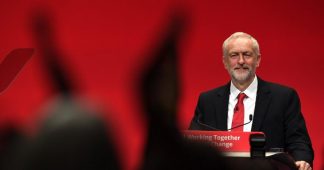Starmer’s silence on Palestinian solidarity day speaks volumes
By his attendance at a pro-Israel event, the Labour leader could not have chosen a more calculated way to gratuitously insult the Palestinians
By Ghada Karmi
1 December 2020
As a Palestinian and member of the Labour Party for over 30 years, I find the Labour Party leader Keir Starmer’s slavish devotion to Zionism increasingly baffling.
On 29 November Starmer and his deputy leader, Angela Rayner, attended a conference organised by the Jewish Labour Movement (JLM), and Labour Friends of Israel (LFI).
Of all dates in the year, Starmer could not have chosen one more calculated to gratuitously insult the Palestinians. His appearance coincided with the UN International Day of Solidarity with the Palestinian people, a major event in the Palestinian calendar, held on 29 November each year since 1977.
Its purpose is to remind the world that the question of Palestine remains unresolved. The “inalienable rights of the Palestinian people”, defined in the 1975 UN General Assembly Resolution 3376, as self-determination and the right of refugee return, are still unfulfilled.
A glaring insensitivity
Every 29 November the UN sends out special messages of solidarity with the Palestinians from the secretary general, the presidents of the General Assembly and Security Council, and heads of other UN bodies and NGOs.
Publications, meetings and films are organised. Subsequently, the UN publishes an annual bulletin, recording these messages, speeches and events.
What message is Starmer sending to the Palestinians on this special day? Or his deputy, who promised the JLM conference to suspend “thousands and thousands” of Labour members (for antisemitism), among whom many may well be Palestine supporters? In a speech full of contrition, she advised Labour members to “get real” about antisemitism. Starmer’s attendance at the JLM/LFI conference would seem to signify at best a glaring insensitivity towards Palestinians, or worse, ignorance of their cause. That is unlikely.
I have written to Starmer to ask him why he ignored the International Day of Solidarity with the Palestinian people and whether or not it was an oversight or that he genuinely believed Palestinians have a lesser claim on his attention than other communities living in Britain. I did not receive any response before this column went to print.
Starmer’s change of heart
Before he became party leader, he was not known for his Zionist sympathies. As a former barrister specialising in international human rights, Starmer would have honoured the UN Day of International Solidarity with the Palestinian people without hesitation.
His past record against the illegal Iraq war, his membership of Labour Friends of Palestine, and his condemnation of the Trump Middle East peace plan as “a farce, inconsistent with international law and human rights protections” all point him in that direction.
In 2015 he spoke at an election hustings on Palestine organised by Camden Palestine Solidarity Campaign, and later declared: “We can promote peace and justice around the world” against the backdrop of Stop the War campaigners holding Palestinian flags.
But since becoming party leader, Starmer has changed. He has embarked on a courtship of the Israel lobby, the antithesis to his earlier positions on Palestinian rights. In January 2020, he adopted the Board of Deputies’ “Ten Pledges” without caveat.
These included the International Holocaust Remembrance (IHRA) definition of antisemitism that conflates antisemitism with anti-Zionism. This conflation has been at the heart of the antisemitism allegations against the Labour Party. Its aim to link criticism of Israel, and by extension support for Palestine, with “antisemitism” has so far been highly successful in hounding out these supporters.
Starmer now describes himself as a “Zionist without qualification” who believes in the state of Israel.
Starmer has never visited Israel, but has promised to do so with the Labour Friends of Israel (LFI) whom he met in July.
LFI was formed in 1957, not long after Israel’s establishment, in solidarity with Israel’s Labor Party. Today, a quarter of the parliamentary Labour Party, and a third of the shadow cabinet are members, in addition to 35 in the House of Lords. In September, a further six from the front bench joined.
The last few years have been difficult and distressing for the Palestinian people and a two state solution has become tragically more distant. On #PalestineDay – and with a new US administration – now is the moment to redouble our efforts for a just and lasting peace. https://t.co/NAueOqC2iY
— Lisa Nandy (@lisanandy) November 29, 2020
Do they know they’ve joined an organisation that described itself in 2003 as a lobby group in Westminster to promote the state of Israel? Would a Labour Friends of South Africa during the apartheid era ever have existed?
Labour and antisemitism
Yet, Starmer is full of praise for LFI, which, according to him, has played a “crucial role” in helping to promote a balanced debate on the Middle East, and a “peaceful two-state solution”. But in 2017, LFI’s deep ties to the Israeli embassy were exposed in an Al Jazeera four-part documentary, The Lobby.
It would be reasonable to conclude from the above that Starmer’s commitment to Zionism had made him anti-Palestinian. He ignored the 29 November Day of Solidarity with them because he quite simply didn’t care. But that would be wrong. It is more likely he was driven by the logic of his conviction that he must make up to those he believes to represent the Jewish community for his party’s alleged antisemitism.
And his deputy merely followed his lead.
He thinks, in this way, the party can regain those Labour members and voters lost to it by antisemitism if it does penance for its sins. That is why Starmer formally apologised to the High Court, and the party made a six-figure payout in July to seven whistleblowers for their “hurt and distress”.
The whistleblowers had sued the party for defamation after it criticised their testimony to a 2019 BBC Panorama investigation into Labour antisemitism. The party, then under Jeremy Corbyn, had been advised it had a strong legal defence against the defamation charge, but Starmer ignored that.
Putting these facts together, we must assume that he believes overt support for the Palestinians could vitiate all his efforts to endear Labour to the Jewish community. And he may or may not be right about that. But the danger of buying into the Zionist agenda in this way is that he becomes an accessory to the suppression of Palestinian rights.
Was that the message he wanted to convey to the Palestinians on their international day of solidarity?
The views expressed in this article belong to the author and do not necessarily reflect the editorial policy of Middle East Eye.
* Ghada Karmi is a former research Fellow at the Institute of Arab and Islamic Studies, University of Exeter. She was born in Jerusalem and was forced to leave her home with her family as a result of Israel’s creation in 1948. The family moved to England, where she grew up and was educated. Karmi practised as a doctor for many years working as a specialist in the health of migrants and refugees. From 1999 to 2001 Karmi was an Associate Fellow of the Royal Institute of International Affairs, where she led a major project on Israel-Palestinian reconciliation.
Published at www.middleeasteye.net











